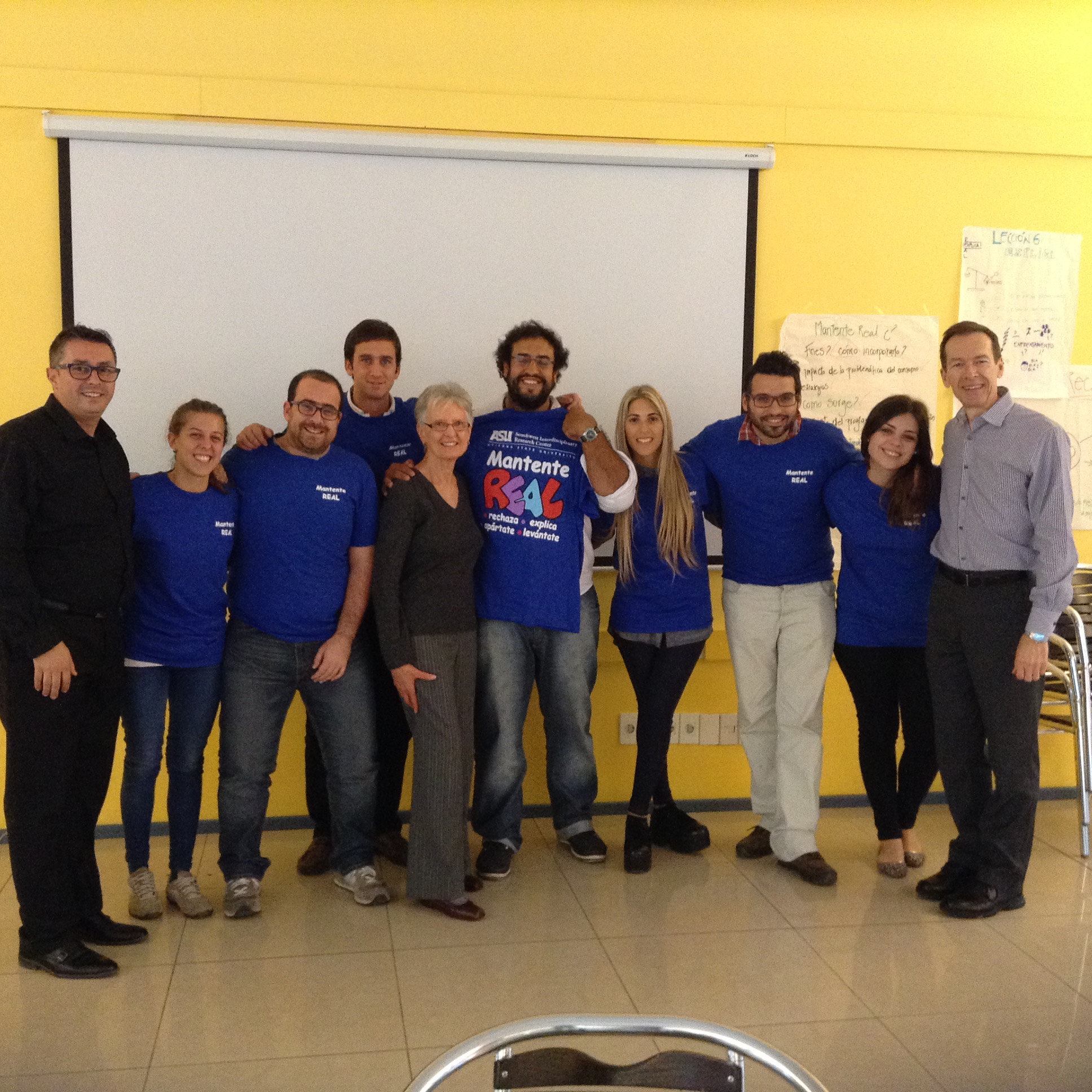keepin' it REAL/Mantente REAL: Cultural adaptation and pilot test in Uruguay

Adolescents aged 11-15 years in the Uruguayan capital city, Montevideo
Flavio F. Marsiglia, PhD
Stephen S. Kulis, PhD
Carlos Libisch, PhD
Paul Ruiz, PhD
This research implemented a culturally adapted Spanish language version of the keepin’ it REAL youth substance use prevention program, called Mantente REAL (MREAL), in Uruguay and conducted feasibility, efficacy and effectiveness studies of MREAL with middle school and elementary school students in Montevideo, the capital. The ASU-GCAHR research team collaborated on the project with the Uruguayan Junta Nacional de Drogas, the Ecumenical Foundation of Uruguay, Uruguayan educational authorities, the American Embassy in Montevideo, and the School of Psychology of the national university of Uruguay, Universidad de la Republica (UdelaR). The overall aim is to increase access and capacity to implement an evidence-based and culturally congruent prevention programs in schools with and for Uruguayan youth.
Substance use and violence prevention.
Cultural adaptation and creation of culturally congruent videos for the Uruguayan context, small Randomized Controlled Trials (RCTs) with elementary and middle school students.
Middle School Feasibility Study: The Mantente REAL intervention group reported desired changes in four of six last 30-day substance use outcomes: relatively smaller increases or actual reductions in the frequency of alcohol and marijuana use and in amounts of cigarette and marijuana use.
Elementary School RCT Study: Mantente REAL students--compared to controls-- reported relative decreases in alcohol use, intentions to use substances, positive expectancies about substance use, and violence victimization, as well as increases in the use of effective drug resistance strategies.
Cultural Adaptation: The project has produced five new videos and has adapted the teacher and student manual.
Marsiglia, F. F., Alarcón-Rubio, D., Kiehne, E., Ayers, S. L., & Kulis, S. S. (2019). School Connectedness, Educational Aspirations, Academic Performance, and Alcohol Use in Uruguay. Health Behavior and Policy Review, 6(3), 276-285. https://doi.org/10.14485/HBPR.6.3.7
Marsiglia, F. F., Kulis, S. S., Kiehne, E., Ayers, S. L., Libisch Recalde, C. A., & Sulca, L. B. (2018). Adolescent substance-use prevention and legalization of marijuana in Uruguay: A feasibility trial of the keepin’it REAL prevention program. Journal of Substance Use, 23(5), 457-465. https://doi.org/10.1080/14659891.2017.1358308
Libisch, C. A., Marsiglia, F. F., Kulis, S. S., Cutrín, O., Gómez-Fraguela, J. A., & Ruiz, P. (2022). The role of peer pressure in adolescents’ risky behaviors. In M. V. Alves, R. Ekuni, M. J. Hermida, & J. Valle-Lisboa, J. (Eds), Cognitive sciences and education in non-WEIRD populations (pp. 115–133). Springer. https://doi.org/10.1007/978-3-031-06908-6_8
Conference Presentations:
Marsiglia, F. F., Kulis, S. S., & Kiehne, E., Alarcón, D., Libisch, C., & Ayers, S. (2017, June). Examining school connectedness and educational aspirations as protective factors for alcohol use among Uruguayan adolescents. Poster presentation at the annual conference of the Society for Prevention Research, Washington, DC.
Marsiglia, F. F., Kulis, S. S., & Kiehne, E. (2017, January). Exploring school connectedness and educational aspirations as mediators of private versus public school attendance and alcohol use among Uruguayan adolescents. Poster presentation at the 21st annual conferences of the Society for Social Work and Research, New Orleans, LA.
Marsiglia, F. F. & Kulis, S. S. (2016, November). Challenges and opportunities in adolescent substance use prevention following the decriminalization of marijuana in Uruguay. Oral presentation at the annual conference of the European Society for Prevention Research, Berlin, Germany.
Marsiglia, F. F., Gonzalvez, A., Barros, L., & Libisch, C. (2016, July). Marijuana decriminalization in Uruguay: Challenges and opportunities related to preventing adolescent drug use. Oral presentation at the 3rd International Sociological Association Forum of Sociology, Vienna, Austria.
Kiehne, E., Marsiglia, F. F., & Kulis, S. (2016, June). Adolescent substance use prevention: Challenges and opportunities related to the decriminalization of marijuana in Uruguay. Poster presentation at the annual conference of the Society for Prevention Research, San Francisco, CA.
Barros, L., Libisch, C., Marsiglia, F. F., Kulis, S., & Ayers, S. (2016, April). Examining the effects of Mantente REAL on adolescent marijuana use in Uruguay. Poster presentation at the 13th Annual Southwest Interdisciplinary Research Center Research Conference, Phoenix, AZ.
Marsiglia, F. F., Kulis, S. S., Ayers, S., Gonzalvez, A., Barros, L., & Libisch, C. (2016, January). Youth drug prevention: Challenges and opportunities related to the decriminalization of marijuana in Uruguay. Poster presentation at the 20th annual conference of the Society for Social Work and Research, Washington, DC.
Invited Presentations & Seminars:
Marsiglia, F. F. & Kylis, S. (2022). Mantente REAL: Un programa de prevención basado en la evidencia. Seminar on consumo de sustancias psicoactivas en Uruguay. (Virtual). School of Psychology, Universidad de la República (UdelaR). Montevideo-Uruguay. November 1.
Marsiglia, F. F., Libisch, C. & Kulis, S. (2021). Mantente REAL in Uruguay, preliminary findings. National Drug Council. Montevideo-Uruguay. September 7.
Marsiglia, F. F. & Kulis, S. (2013). La Prevención de Drogas con Preadolescentes: Programas Científicamente Validados y Culturalmente Adaptados. Youth Substance Abuse Prevention Symposium. Municipal Drugs Council of Montevideo. Salón Azul, City Hall of Montevideo. Montevideo-Uruguay, December 18.
Marsiglia, F. F. & Kulis, S. (2004). El Programa REAL.: Un Modelo de Prevención. Facultad de Medicina, Hospital de Clínicas, Universidad de la República (UdelaR), Uruguay. November 19.
Marsiglia, F.F. & Kulis, S. (2000). Drug Resistance Strategies, research results and applicability to Uruguay. Faculty of Social Sciences and Communication, Universidad Católica del Uruguay. Montevideo, Uruguay, November 21-23.
Marsiglia, F.F. (1996). Current issues in applied social sciences research and the role of the social worker in the U.S.A. and in Uruguay. Seminar for faculty and students. Department of Social Work, Faculty of Social Sciences and Communication, Universidad Católica del Uruguay. Montevideo-Uruguay. July 29-August 1.